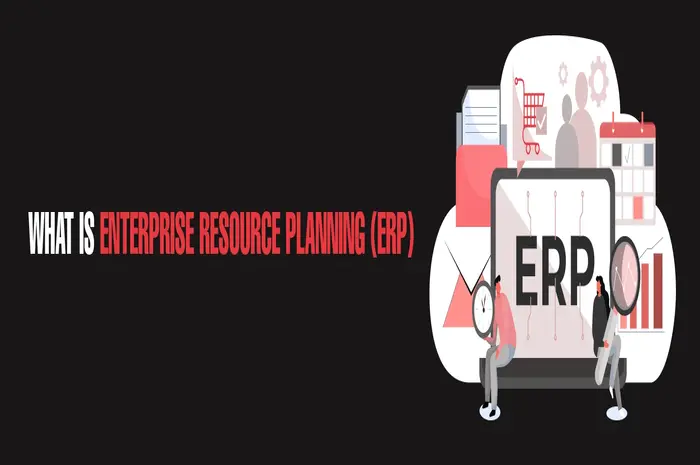.webp)
Enterprise resource planning (ERP) is a comprehensive business management software that integrates various core processes to streamline operations and improve efficiency.
ERP systems have become essential for businesses of all sizes as they offer a centralized platform to manage and automate different functions like finance, supply chain, manufacturing, human resources, and customer relationship management.
What is ERP?
ERP, short for Enterprise Resource Planning, refers to a software system that enables organizations to manage their core business processes in a unified and integrated manner. It provides a centralized database that connects different departments and facilitates real-time information sharing.
With an ERP system, businesses can automate processes, enhance productivity, and gain valuable insights for informed decision-making.
Benefits of ERP for businesses
Implementing an ERP system offers numerous benefits to businesses. Firstly, it improves operational efficiency by automating routine tasks and eliminating manual data entry. This reduces the risk of errors and frees up employees’ time to focus on more strategic activities. Secondly, ERP enables better collaboration between departments by providing a single source of truth. This fosters transparency, improves communication, and enhances overall productivity.
Additionally, ERP systems provide advanced reporting and analytics capabilities, allowing businesses to gain valuable insights into their operations and make data-driven decisions.
- Lower costs and increase productivity
- Centralize and standardize data
- Improve data security and compliance
- Automate tasks and free up employees for value-added projects
- Provide real-time information for better decision-making
- Enhance customer service and order accuracy
- Optimize inventory levels and reduce costs
- Improve cash flow through better invoicing and collection tools
- Enhance data and cloud security
- Streamline business processes
- Improve supply chain management
- Support growth and improve customer satisfaction
- Enable cost savings in various areas such as financial close, inventory planning, forecasting, and purchasing spend
Understanding the components of an ERP system
An ERP system consists of several components that work together to provide a comprehensive solution for businesses. The core component is the central database, which stores all the data related to various business functions. This database is accessible to different departments, ensuring data consistency and accuracy. Another essential component is the user interface, which allows employees to interact with the system and perform their tasks.
The user interface should be intuitive and user-friendly to encourage adoption and maximize productivity. Additionally, ERP systems often include modules or applications specific to different functions, such as finance, inventory management, and human resources.
Difference between ERP and financials
- ERP systems encompass a broader range of business operations, while financials specifically focus on managing finances.
- ERP systems integrate and consolidate financial data from various source systems, whereas financials solely deal with financial accounting data.
- ERP systems standardize, streamline, and integrate processes across multiple business functions, including finance, while financials concentrate solely on financial processes.
- ERP systems offer a unified approach to managing all aspects of a business, while financials primarily focus on financial transactions and reporting.
- ERP systems provide a comprehensive solution for managing all business operations, whereas financials serve as a subset of the ERP system, specifically catering to financial management needs.
Reasons why businesses need to move to an ERP cloud solution
In recent years, there has been a significant shift towards cloud-based ERP solutions. There are several reasons why businesses are opting for cloud-based ERP systems over traditional on-premises solutions. Firstly, cloud-based ERP offers greater flexibility and scalability, allowing businesses to adjust their system as their needs evolve.
It also eliminates the need for costly hardware infrastructure and maintenance, reducing IT expenses. Additionally, cloud ERP provides enhanced accessibility, enabling employees to access the system from anywhere, at any time, using any device with an internet connection. This promotes collaboration and remote work while ensuring data security.
How to choose the right ERP system for your business
Selecting the right ERP system for your business is crucial to ensure a successful implementation. The first step is to assess your business requirements and identify the key functionalities you need from an ERP system. Consider factors such as scalability, integration capabilities, industry-specific features, and ease of use. It is also essential to evaluate the vendor’s reputation, financial stability, and customer support services.
Additionally, conducting demos and requesting references can provide valuable insights into the system’s usability and suitability for your business. Lastly, take into account the total cost of ownership, including licensing fees, implementation costs, ongoing maintenance, and training expenses, to make an informed decision.
Implementing an ERP system
Implementing an ERP system requires careful planning and execution to ensure a smooth transition. The first step is to define clear objectives and establish a project team responsible for overseeing the implementation process. It is crucial to involve key stakeholders from different departments to capture their requirements and gain their buy-in.
The next phase involves data migration, where existing data from various systems needs to be transferred to the new ERP system. This process requires thorough data cleansing and validation to prevent any discrepancies. Once the data is migrated, extensive testing should be conducted to identify and resolve any issues before going live.
Overcoming common challenges in ERP implementation
ERP implementation can present various challenges that organizations need to address proactively. One common challenge is resistance to change from employees who are accustomed to existing processes. To overcome this, it is essential to communicate the benefits of the new system and provide comprehensive training and support to ensure a smooth transition. Another challenge is data integrity, as data from multiple sources needs to be consolidated and standardized in the new ERP system. Regular data audits and validation processes can help maintain data accuracy.
Additionally, organizations must allocate sufficient time and resources for testing and resolving any technical issues that may arise during the implementation.
Training and support for ERP users
Providing adequate training and support to ERP users is crucial for maximizing the system’s benefits. Training should be tailored to the specific needs of different user groups, focusing on their respective roles and responsibilities within the ERP system. This can include hands-on training sessions, workshops, and access to online resources and documentation.
Ongoing support is equally important to address any user queries or issues that may arise post-implementation. Establishing a dedicated support team and implementing a ticketing system can ensure timely resolution of user concerns, fostering user adoption and satisfaction.
Best practices for successful ERP implementation
To ensure a successful ERP implementation, organizations should follow best practices throughout the process.
Firstly, it is essential to define clear objectives and establish a well-defined project plan with realistic timelines and milestones. This helps keep the implementation on track and enables effective monitoring and control. Secondly, organizations should prioritize change management and involve key stakeholders from the early stages to gain their support and commitment. This can include conducting workshops, town hall meetings, and regular communication to address concerns and build enthusiasm. Finally, organizations should conduct regular post-implementation reviews to evaluate the system’s performance, identify areas for improvement, and make necessary adjustments.
- Establish a strong project team with an executive sponsor, project manager, and representatives from relevant business groups.
- Clearly define key requirements and link them to business goals.
- Identify key performance indicators (KPIs) to measure success.
- Implement effective project management practices, including managing scope creep and addressing technical details.
- Foster collaboration and communication throughout the implementation process.
- Provide comprehensive training and support to ensure employees can effectively use the system.
- Avoid common pitfalls such as not setting clear requirements, resistance to change, lack of communication, lack of training and support, rushing the project, underestimating data migration, and inadequate system testing.
- Assemble a dedicated project team with the right skills and capabilities.
- Involve cross-functional and end users throughout the implementation process.
- Recruit busy people with a deep understanding of the business processes, good teamwork skills, and executive management respect for the project.
- Ensure executive support for decision-making regarding priorities and resources.
- Dedicate the best people to the project full-time or as much as possible.
Conclusion
In conclusion, ERP systems have become a necessity for businesses looking to improve operational efficiency, streamline processes, and gain a competitive edge. Understanding what ERP is and its benefits is crucial for organizations considering its implementation. By selecting the right ERP system, overcoming implementation challenges, and providing adequate training and support, businesses can leverage ERP to transform their operations and drive growth. With the availability of cloud-based ERP solutions, organizations can embrace the flexibility and scalability offered by the cloud while enjoying the advantages of an integrated and comprehensive ERP system.







